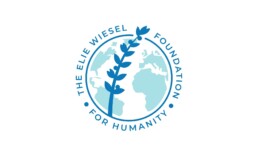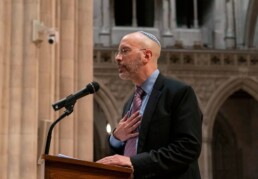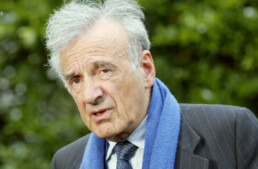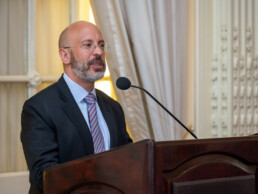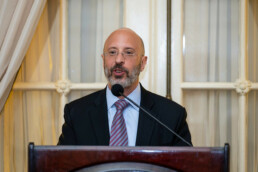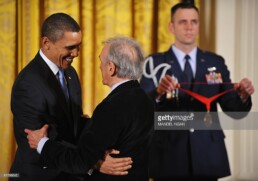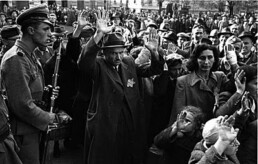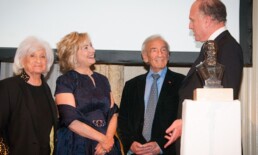A New Philanthropic Strategy
The Elie Wiesel Foundation for Humanity (EWF) in New York is launching a new impact-driven philanthropic strategy to advance human rights around the world.
The foundation, led by Elisha and Marion Wiesel, will adopt a hybrid approach that will not only grant funds but also work with organizations directly as partners, offering access to innovative thinking partners and acting as an emblematic megaphone to champion their cause.
The foundation’s recalibrated grantmaking program will seek to fund organizations that embody Nobel Peace Prize winner Elie Wiesel’s legacy as an educator and activist. Grants to educators will support moral educational programs inspired by Jewish values. The foundation is seeking to support programs and projects that foster dialogue, especially in engaging ways.
Activist grants, meanwhile, will focus on programs that restore the rights and dignity of the Uyghur population, in keeping with Elie Wiesel’s belief that “sometimes we must interfere. When human lives are endangered, when human dignity is in jeopardy, national borders and sensitivities become irrelevant. Whenever men or women are persecuted because of their race, religion or political views, that place must – at that moment – become the centre of the universe.”
The foundation will be awarding one or more grants in each portfolio for its next cycle, ranging in size from $50,000 to $200,000. Applicants must be financially sound 501(c)(3) tax-exempt organizations or have a U.S.-based fiscal sponsor at the time of application, and be able to demonstrate realistic plans for carrying out the program or project for which they seek funding. Submissions will be reviewed internally through various stages and finalists will be considered by a group of notable names, passionate about the respective value track. Grant applications are being accepted online through the foundation’s website (eliewieselfoundation.org) and are due by Dec. 15, 2022.
“The values my father stood for – combating indifference, educating youth, calling out injustice and defending human rights – continue to be the moral bedrock of the Elie Wiesel Foundation,” said Elisha Wiesel. “We are so excited to announce our new grantmaking program to provide nonprofits that embody those values with the resources to achieve lasting impactful change.”
“Elie Wiesel was my dear friend and trusted partner in the fight for human rights around the world. I think it is very appropriate that his foundation put the fate of the Uyghur people as one of its main priorities and will be focused on delivering resources and moral support to those advocating for the Uyghurs,” said human rights activist and EWF advisory board member Natan Sharanksy. “The free world cannot stay silent about China’s horrific persecution of its Uyghur minority. I know firsthand the power of outside support to those standing bravely against totalitarian regimes. That is why I am glad to serve as an advisory board member at the Elie Wiesel Foundation, dealing with this issue.”
Other members of the advisory board on the Uyghur crisis include Mark Hetfield, president and chief executive officer of the Hebrew Immigrant Aid Society, the oldest resettlement organization in the world; and Gulhumar Haitiwaji, the daughter of a Uyghur woman who survived a Chinese re-education camp.
The advisory board on moral educational programs includes neuroscientist, actress, podcast host and author Mayim Bialik, an outspoken activist for mental health and Jewish causes; Dr. Mehnaz Afridi, a professor of religious studies and the director of the Holocaust, Genocide and Interfaith Education Centre at Manhattan College; and Sarah Idan, the founding chief executive officer of Humanity Forward, a multi-dimensional organization that promotes education and peace.
The Elie Wiesel Foundation was established after Wiesel was awarded the Nobel Peace Prize in 1986. Under the direction of Wiesel and his wife Marion, the foundation developed, implemented and funded several critical humanitarian programs in Israel, including the Beit Tzipora Centres and the Darfurian Refugee Program. This new direction will allow the foundation to widen its scope through meaningful, action-driven partnerships.
INTERVIEW: ‘History is something you want to be on the right side of’
Elisha Wiesel discusses the Elie Wiesel Foundation’s focus on Uyghur advocacy.
By Adile Ablet for RFA Uyghur
Since its founding in 1986, the Elie Wiesel Foundation for Humanity has striven “to combat indifference, intolerance and injustice through international dialogue and youth-focused programs that promote acceptance, understanding and equality.” In late January, the human rights organization ran a full-page advertisement in The New York Times calling for a boycott of the 2022 Winter Olympics in Beijing unless China ended its persecution of the Uyghurs in Xinjiang. Now, the foundation has added grantmaking to its lineup of activities, focusing on funding advocacy for the Uyghurs.
The foundation expects to award about U.S. $250,000-$500,000 early next year to two groups, each representing one of its focuses, as determined by relevant advisory committees, according to the Jewish Insider. The funding is significant in that it is coming from an influential Jewish organization at a time when majority-Muslim countries joined China in voting down a measure for the U.N. Human Rights Council to conduct debate on a U.N. report that China’s atrocities against Uyghurs may “constitute crimes against humanity.”
Adile Ablet of RFA Uyghur recently spoke with Elisha Wiesel, the foundation’s chairman of the board and son of late Holocaust survivor and Nobel Peace Prize laureate Elie Wiesel, about the grantmaking activities and what the foundation hopes to accomplish with its focus on the Uyghurs. The following interview has been edited for length and clarity.
RFA: The Jewish Insider reported that the Elie Wiesel Foundation will support the Uyghur cause now that the organization is becoming a grantmaker. Why?
Wiesel: One of the things we’re doing with the Elie Wiesel Foundation today is we’re pivoting from running direct programs, which is what the foundation used to do. It used to host conferences. It used to be [active] particularly in Israel, with Ethiopian Jews who had arrived. We decided we could have a bigger reach and have more partner organizations that we could help supply funding to. We can also supply some of our time and our thoughts. We can help use my father’s name to achieve good in the world.
We thought a lot about this path that we’re embarking on [in terms of] the hats my father wore during his lifetime. He was so many things to so many people. My father was a teacher, a philosopher, a refugee, a student. And we said, maybe what we can do is for every different type of role that my father played, we can eventually open up a line of grantmaking and partnership.
When we thought about where to start, my view and the board’s view were that the two most important roles father played were that of an activist and a teacher, so these are the two lanes that the foundation is starting with. Once we decided what that activism would be, the question then became which cause do we want to attach ourselves to in the beginning as we start this?
For me, there’s really no cause that is as compelling as the Uyghur cause, which has a lot of properties that fit the way my father approached the world. Look at the size and the scope of the atrocities that are occurring with the Uyghur people — the mass imprisonment of a million Muslims, family separations, the concept of going to jail just because of who you are rather than something that you did. These are terrible human rights violations, and they are being perpetrated by a major actor on the world stage.
One of the things to know about my father is that he was not afraid of speaking truth to power. It’s very hard to imagine getting the Chinese government to change course and doing something more humane, but it’s not impossible. We were inspired as we looked at the Soviet Union which was treating Soviet Jews in a certain way, but many people thought you never were going to be able to change it; the best you can hope for is that you can help a few people by reaching out to people in power, but to try to achieve something on a massive scale just wouldn’t happen.
My father disagreed. He disagreed with many important people, and he worked with students in this country to build a movement from the ground up. There were many great leaders there who ultimately had great impact with the Soviet Union. That’s why I think the Elie Wiesel Foundation is inspired by big projects that seem impossible — ones that seem really difficult, but ones that we feel are very important.
RFA: What do you expect to achieve with the organizations that the foundation will work with?
Wiesel: The goal is ultimately to have an impact, but how you measure impact is very difficult. Is anything that we fund in this first year and our activist players’ focus on the Uyghurs going to change the world and move it upside down in one year? I think we’re more humble than that.
One of the things that my father said about the Holocaust was that it was important for the people who were suffering to feel heard and know that people cared, even if the world couldn’t do anything about it. One of the things that hurt the most was that there was a sense that the world didn’t care. If we can do anything to raise the stature of the story, and if we can find a partner organization to work with that, it would make the Uyghurs’ suffering more a part of our daily consciousness so that the Uyghurs feel heard. Then they would say, “OK, maybe the world isn’t fixing everything right away for us, but at least we haven’t been forgotten. At least, we know that somebody is thinking about us.” Even that for us would be a very significant accomplishment.
Our approach is a humble approach. [Part of] the way that we think about it is that we don’t know what the right answer is. We don’t know what the strategy is, but we want to hear ideas. That’s why what we’re really hoping for is that many different organizations doing work in the Uyghur space will go to our website and send us their ideas — tell us what they’re doing, so that the more ideas we have, the better the chance of our finding the one that is right for us to partner with.
RFA: Which criteria will you use to select partner organizations?
Wiesel: I can’t say that there’s one particular criterion, but the boldness of the vision is important — the idea that it’s something that is unlikely to happen unless we get involved. We want to be involved with emerging efforts, ones that we can help grow and bring others into. The quality of the people doing the work [also matters]. Do we believe that it’s being sponsored by people who are visionary but also capable of executing, that this is a partner that can really deliver on the sorts of things that they want to achieve? These are the things that we will try to sort out. … But the truth is that the paper application process is only the beginning, and with ideas that we think look interesting, we’re going to want to have many conversations with the grantees. We have an excellent staff at the foundation that is trained and ready to have those conversations.
RFA: One of the members of the advisory board for the Uyghur grants is Gulhumar Haitiwaji, the daughter of Gulbahar Haitiwaji, who wrote a memoir about the three years she was detained in a “re-education” camp in Xinjiang. What role will the advisory board members play?
Wiesel: I’m really glad you mentioned the advisory boards because they are not going to be permanent board members of the Elie Wiesel Foundation. … We’re going to convene one-time advisory groups. We’re very glad to have [Gulhumar] join the advisory group for [Uyghur grants]. We very much wanted someone from the community with strong connections. I read her mother’s book, and I was fortunate enough to interview her and the daughter. They are unbelievable. There are very clear thinkers with such strong messages to send. We’re very fortunate, but we’re also lucky to have a number of other great stars join us. We have Mark Hatfield, who is the executive director of the Hebrew Immigrant Aid Society. This is the society that some 70 years ago helped my mother find somewhere to live when she came over with her family as a refugee from Europe. We also have Natan Sharansky, a close friend of my father’s, who was a refusenik. He was imprisoned by the Soviets and went on to become a major human rights activist himself. We have very notable and thoughtful people to help us. We know we need a lot of advice and a lot of opportunities to find the best [partner].
RFA: What message would you like to send to China?
Wiesel: My message is that history is something you want to be on the right side of. Future generations will look back at this time and they’ll say, “OK, who did what? Who was on which side here?”
A documentary called “The U.S. and the Holocaust” by [American filmmaker] Ken Burns recently came out, and so many people are watching it because it’s fascinating to see in the 1930s and the 1940s what different people were doing, what different countries were doing, what different groups were doing, and where they were aligning on this issue. For those people who did everything they could do to prevent a war with Germany and those who did everything they could to prevent saving the Jews, they don’t look good in retrospect in history. Now, the message is simply that [people are] doing things that are expedient because they have trade relationships or there’s a deal on the line or there’s money involved. And then there is doing things that are right for the generations and for the long term. I hope in time that the thinking will shift.
I was invited to speak to the U.N. on International Holocaust Remembrance Day in January, and I was given only three minutes. I gave my last minute 100% to the Uyghur cause before the Beijing Olympics. I was warned beforehand that everybody was so angry [that the foundation had issued a message]. They’re like, “You can’t do these things; how can you put out this message?” There was a lot of pressure to not give that message because I think the United Nations itself is a little conflicted on how it feels about this. But the good news is that months later, [former U.N. human rights chief] Michelle Bachelet actually went [to China] and came back with some findings that there are human rights violations. So, even the U.N., which is the slowest of these organizations, the most bureaucratic, and [one with] the most voices, is potentially capable of coming around and seeing this more clearly, which gives me confidence that the world will follow.
Elie Wiesel Foundation to Launch New ‘Hybrid’ Philanthropic Strategy
The organization said its new approach will not only support human rights through funding but also through working side by side with human rights groups.
The Elie Wiesel Foundation for Humanity (EWF) announced last week that it plans to launch a new philanthropic strategy to promote human rights across the globe.
The organization said its new approach, which it calls a “hybrid approach,” will not only support human rights through funding but also through working side by side with human rights groups.
Furthermore, EWF’s revamped grantmaking program will provide funding to educators who the group believes embody the legacy of Holocaust survivor, writer and human rights activist Elie Wiesel and to educational programs “inspired by Jewish Values,” the group said, adding that “The Foundation is seeking to support programs and projects that foster dialogue, especially in engaging ways.”
Additionally, EWF plans to promote “programs that restore the rights and dignity of the Uyghur population” with activist grants. The foundation said it will award at least one grant, worth between $50,000 and $200,000, in each portfolio in 2022
“The values my father stood for – combatting indifference, educating youth, calling out injustice, and defending human rights – continue to be the moral bedrock of the Elie Wiesel Foundation,” said Elisha Wiesel, co-chair of EWF. “We are so excited to announce our new grantmaking program to provide nonprofits that embody those values with the resources to achieve lasting impactful change.”
I think it is very appropriate that his Foundation put the fate of the Uyghur people as one of its main priorities and will be focused on delivering resources and moral support to those advocating for the Uyghurs.
Natan Sharansky, EWF Advisory Board member and human rights activist
Natan Sharansky, a human rights activist and member of the EWF Advisory Board, added: “Elie Wiesel was my dear friend and trusted partner in the fight for human rights around the world. I think it is very appropriate that his Foundation put the fate of the Uyghur people as one of its main priorities and will be focused on delivering resources and moral support to those advocating for the Uyghurs. The free world cannot stay silent about China’s horrific persecution of its Uyghur minority. I know firsthand the power of outside support to those standing bravely against totalitarian regimes. That is why I am glad to serve as an Advisory Board member at the Elie Wiesel Foundation, dealing with this issue.”
Your Daily Phil: Elie Wiesel Foundation Places focus on Uyghurs + World Mental Health Day and Jewish camp
Good Thursday morning and mo’adim l’simcha!
Ed. note: In observance of chol hamoed, Shemini Atzeret and Simchat Torah, the next Your Daily Phil will arrive on Wednesday, Oct. 19, after which we will resume our regular publishing schedule. Chag sameach!
In today’s Your Daily Phil, we give you an exclusive on a transformation at the Elie Wiesel Foundation for Humanity. In addition, we feature op-eds by BBYO’s Drew Fidler and FJC’s Jill Goldstein Smith on mental health during Sukkot, and by Stephen Mills on confronting child sex abuse. Also in this newsletter: Ron Krit, U.K. Chief Rabbi Ephraim Mirvis and Robert Toll. We’ll start with a new framework for grantmaking at the Lippman Kanfer Foundation for Living Torah.
After a year and a half of making no new grants, the Lippman Kanfer Foundation for Living Torah will resume making grants early next year. The return to grantmaking coincides with a search for a new president and the rollout of a fresh organizational philosophy, shared with the foundation’s stakeholders yesterday via email.
The new philosophy centers on what the foundation, which funds innovative Jewish religious and ritual organizations, and has an annual budget of $3 million, calls the “three Ps” — standing for purpose, practice and people. The idea, in the foundation’s words, is that purpose, or “core aims and aspirations,” inspires people and guides practice, which includes rituals, norms and behaviors. People, meanwhile, live out the purpose through practice.
Mamie Kanfer Stewart, the foundation’s chair and acting president, told eJewishPhilanthropy that the three key words represent a sharpening of the foundation’s philosophy, rather than a shift. The foundation is still determining how the framework will influence its grantmaking.
“We still are holding the center around applying living Torah wisdom, applying Jewish wisdom, we know we still are focused on organizations that are addressing the big human questions and bringing Jews into the conversation,” she said. Ayalon Eliach, the foundation’s chief ideas officer, told eJP, “Our hypothesis is that this can be a really useful framework both for understanding how we think Jewish wisdom can be applied throughout people’s lives [and] can be an incredibly helpful tool for our collaborators in creating programming that brings people what they’re looking for.”
The foundation froze its process for new grants in July 2021, when its then-president, Aaron Dorfman, departed to head A More Perfect Union, a Jewish pro-democracy initiative supported by the foundation. His departure came after a year in which the foundation funded a range of Jewish ritual and educational responses to COVID-19, from Zoom programming to being part of a consortium of foundations that funded an initiative to chronicle the Jewish experience during the pandemic.
“We have a strategy that is about looking out at the field… and seeing, where is there potential to do something that is meaningful across the board, meaningful to the field or meaningful to history for the Jewish community?” Kanfer Stewart said. “If we see an opportunity, we want to help step into that space.”
Elie Wiesel’s Namesake Foundation to Place Focus on Funding Advocacy for Uyghurs
When Elisha Wiesel, son of Holocaust survivor and Nobel Peace Prize laureate Elie Wiesel, spoke at a United Nations commemoration on International Holocaust Remembrance Day this past January, he began with the topics one might expect: the suffering of his father and grandfather at the hands of the Nazis, the challenges of children of survivors like himself and the dangers of present-day antisemitism.
But he devoted the last minute of his three-minute speech to a crisis half a world away from Auschwitz: the persecution of China’s Uyghur Muslim minority.
“My father firmly believed that his faith required him to fight hatred and oppression everywhere,” the younger Wiesel said. “Are we brave enough to follow? China… inflicts mass internment, forced labor and forced sterilization on the Uyghur people.”
The speech was one of a few ways Wiesel spoke out earlier this year about the plight of the Uyghurs, writing a viral Facebook post a week later on the occasion of the start of the Beijing Olympics and publishing a full-page ad by the Elie Wiesel Foundation for Humanity in The New York Times calling for a boycott of the games unless China changed its policy. The ad was cosigned by several Uyghur rights groups.
Now, eJewishPhilanthropy has learned, Wiesel has made speaking out on the Uyghur genocide a central part of the transformation of his father’s namesake foundation. The foundation is becoming a grantmaker, and Uyghur advocacy is one of its two initial focuses. The other is moral education through a Jewish lens. Wiesel told eJP that he sees both as ways to carry on his father’s decades of activism.
“We’re really thinking about ways that align with the different hats that my father wore, the different roles in which he showed up in the world,” Wiesel told eJP. “My father was an activist. This year the activist lane will be focused on the Uyghur cause… finding ways to help the Uyghur people articulate their cause, achieve change, gain the recognition that their cause deserves.”
The foundation hasn’t settled on a grantmaking budget yet, but plans to award approximately $250,000 to $500,000 in total to two groups, each representing one of the focuses. The grants will be awarded early next year and will be determined by advisory committees, each including some marquee names. The advisory board on the Uyghur grants includes former Soviet refusenik and Jewish Agency for Israel Chair Natan Sharansky, as well as Gulhumar Haitiwaji, the daughter of a Uyghur woman, Gulbahar Haitiwaji, who wrote a memoir detailing her experience in a Chinese concentration camp.
“What makes it especially powerful is the name of Elie Wiesel behind it,” said Mark Hetfield, CEO of the Jewish refugee aid group HIAS, who is also on the advisory board. “That’s where I think the real value add is… We dont want to equate [the Uyghur genocide] or compare it to the Holocaust, but it is a genocide.”
While the elder Wiesel was alive, his foundation focused on convening conferences of fellow Nobel Peace Prize winners, as well as other dignitaries, to advance peace and human rights. It also runs educational centers for Ethiopian Israelis. The foundation was a victim of Bernie Madoff’s Ponzi scheme in 2008, but Wiesel says it is now on sound footing, and it has a budget of approximately $600,000 and three employees.
The younger Wiesel, who worked for Goldman Sachs for 25 years, including as its chief information officer, is embarking on a new financial business venture while he also oversees the foundation’s transformation. The foundation will fundraise to cover the grants.
“We’re not intending to begin fundraising immediately, but we want to establish a track record that we can make smart, thoughtful, impactful gifts by using the combination of my father’s name, my input and the assets that we have to achieve change,” Wiesel said.
Wiesel has also been outspoken on other issues, including combating anti-Zionism and antisemitism. But he said the focus on Uyghur advocacy was inspired by his father’s activism in the movement to free Soviet Jewry, a cause that the elder Wiesel helped advance in the Jewish community by invoking his experience as a Holocaust survivor. Elisha Wiesel sees confronting China on the Uyghur genocide as a challenge of similar magnitude.
“My father had no problem standing up to the biggest aggressors in the world,” Wiesel said. “When the big powerful Soviet Union was keeping Soviet dissidents behind bars and preventing them from emigrating to Israel simply because they were Jewish… My father had no problem going up to one of the biggest presences on the world stage and challenging them through his actions.”
In addition, while Wiesel expects that the selection process for the moral education grant will privilege Jewish organizations, he isn’t excluding the possibility that a non-Jewish group may be selected.
The foundation stands to join other Jewish groups that have spoken out on the Uyghur genocide. Jewish World Watch, which was founded 18 years ago to oppose the genocide in Darfur, advocated for U.S. legislation passed in 2021 banning goods made with forced labor in the Chinese province of Xianjiang, which is the Uyghur population center, and created a database of those companies with more than 900 entries, including Coca Cola, Apple, BMW, Volkswagen, Nike and others.
“Because of what’s happening to the Uyghurs and how scarily similar it is — people being taken in the night, families being separated, being put on trains, sent to concentration camps, having your head shaved when you arrive… there is a unique role that the Jewish community can play,” Serena Oberstein, Jewish World Watch’s executive director, told eJP. “We know better than anyone else what happens when the world sits silent, which means we have to be amplifying voices.”
Wiesel knows that the foundation’s grants alone will not end the oppression of the Uyghurs, and hopes to work in partnership with other organizations, including Jewish groups. But he hopes that along with advancing that cause, the foundation’s work on behalf of the Uyghurs will show people that the legacy of Elie Wiesel extends beyond the seminal memoir Night, and is still relevant in the present day.
“In the coming years, success is that when people think of my father the experience doesn’t stop at Night,” he said. There’s this idea that all of these people who are reading Night — and thank God so many people are reading Night — there’s this concept that Elie Wiesel and the things he stood for are still taking place in the modern day.”
Elie Wiesel Foundation Launches Its New Approach for Advancing Human Rights
The late Elie Wiesel’s son and wife, Elisha and Marion Wiesel, will oversee a hybrid approach involving both financial backing and advocacy for human rights grantees.
The Foundation, led by Elisha and Marion Wiesel, will adopt a hybrid approach that will not only grant funds but also work with organizations directly as partners, offering access to innovative thinking partners and acting as an emblematic megaphone to champion their cause.
The Foundation’s recalibrated grantmaking program will seek to fund organizations that embody Nobel Peace Prize winner Elie Wiesel’s legacy as an educator and activist. Grants to educators will support moral educational programs inspired by Jewish values. The Foundation is seeking to support programs and projects that foster dialogue, especially in engaging ways.
Activist grants, meanwhile, will focus on programs that restore the rights and dignity of the Uyghur population, in keeping with Elie Wiesel’s belief that “sometimes we must interfere. When human lives are endangered, when human dignity is in jeopardy, national borders and sensitives become irrelevant. Whenever men or women are persecuted because of their race, religion, or political views, that place must – at that moment – become the center of the universe.”
The Foundation will be awarding one or more grants in each portfolio for its 2022 cycle, ranging in size from $50,000 to $200,000. Applicants must be financially sound 501(c)(3) tax-exempt organizations, able to demonstrate realistic plans for carrying out the program or project for which they seek funding. Submissions will be reviewed internally through various stages and finalists will be considered by a group of notable names, passionate about the respective value track. Grant applications are being accepted online through the Foundation’s website and are due December 31, 2022. Learn more here.
“The values my father stood for – combatting indifference, educating youth, calling out injustice, and defending human rights – continue to be the moral bedrock of the Elie Wiesel Foundation,” said Elisha Wiesel. “We are so excited to announce our new grantmaking program to provide nonprofits that embody those values with the resources to achieve lasting impactful change.”
“Elie Wiesel was my dear friend and trusted partner in the fight for human rights around the world. I think it is very appropriate that his Foundation put the fate of the Uyghur people as one of its main priorities and will be focused on delivering resources and moral support to those advocating for the Uyghurs,” said human rights activist and EWF Advisory Board member Natan Sharanksy. “The free world cannot stay silent about China’s horrific persecution of its Uyghur minority. I know firsthand the power of outside support to those standing bravely against totalitarian regimes. That is why I am glad to serve as an Advisory Board member at the Elie Wiesel Foundation, dealing with this issue.”
ADVISORY BOARD ON UYGHUR CRISIS TO INCLUDE:
Natan Sharansky is a human rights activist and author who spent nine years in Soviet prisons as a refusenik during the 1970’s and 1980’s. From 1996-2005 Sharansky served as Minister as well as Deputy Prime Minister, in four successive Israeli governments. Sharansky served as Chairman of the Jewish Agency for Israel from 2009-2018. He was awarded the Congressional Gold Medal in 1986 and the Presidential Medal of Freedom in 2006.
Mark Hetfield is the president and CEO of HIAS, the oldest resettlement organization in the world.
Gulhumar Haitiwaji is the daughter of a Uyghur woman who survived a Chinese re-education camp.
ADVISORY BOARD ON MORAL EDUCATION TO INCLUDE:
Mayim Bialik is a neuroscientist, an actress, a podcast host, an author, and an outspoken activist for mental health and Jewish causes.
Dr. Mehnaz Afridi is a Professor of Religious studies and the Director of the Holocaust, Genocide, and Interfaith Education Center at Manhattan College.
Sarah Idan holds the title of 2017-2018 Miss Iraq and is the founding CEO of Humanity Forward, a multi-dimensional organization that promotes education and peace.
The Elie Wiesel Foundation was established after Elie was awarded the Nobel Peace Prize in 1986. Under the direction of Elie and his wife Marion, the Foundation developed, implemented and funded several critical humanitarian programs in Israel, including the Beit Tzipora Centers and the Darfurian Refugee Program.
This new direction will allow the Foundation to widen its scope through meaningful, action-driven partnerships.
About The Elie Wiesel Foundation for Humanity: Elie Wiesel and his wife, Marion, established The Elie Wiesel Foundation soon after he was awarded the 1986 Nobel Prize for Peace. Now spearheaded by Marion and Elie’s son Elisha Wiesel, the Foundation seeks to spark ethical consciousness of human rights by investing in programs that promote moral leadership and real-world outcomes for victims of injustice, and by making Elie’s teachings accessible via a central online archive. To learn more, visit: https://eliewieselfoundation.org/
Foundation Named After Elie Wiesel Plans to Fund Uyghur Activists
Named after Holocaust survivor and Nobel Peace Prize laureate Elie Wiesel, the foundation he started with his wife in 1986 plans to be a grant maker of Uyghur advocacy.
2009 National Humanities Medal Awarded to Elie Wiesel
President Barack Obama presented the 2009 National Humanities Medals to eight Americans for their outstanding achievements in history, literature, cultural philanthropy, and museum leadership. Elie Wiesel was awarded for “his unwavering commitment to preserving the memory of the Holocaust and its victims. He has fostered compassion and understanding through his writing, his leadership, and his relentless advocacy for human rights.”
The medals, first awarded in 1989, were presented during a ceremony in the East Wing of the White House. After the ceremony, the medalists and their families and friends joined the President and First Lady Michelle Obama in a reception in their honor.
-Washington D.C., February 25th, 2010
Elie Wiesel to Hungary: Keep Your Award
Modern Jews have the luxury of thinking however we want about the Holocaust — if we think about it all. For some, it is nothing, for others a distant familial memory. For a bold few, it can even be the object of humor. (Hungarian Spectrum)
Not so for Jews of earlier generations, for whom the smoke of the camps is far more pungent. And as survivors of the camps dwindle in number, their voices, their invocations to never forget, become ever more urgent.
And no voice is more urgent than that of Nobel Prize winner Elie Wiesel, whose “Night” remains probably the most widely-read nonfiction chronicle of the six million who perished, not to mention those who live with the scars.
Wiesel is in the news today because he has returned a Hungarian prize he won in 2004. He no longer wants it, convinced that Hungary is “whitewashing” its collaboration with the Nazis, according to an AFP report.
Read More
Clinton at WJC Dinner: ‘Wiesels Played Pivotal Part in Bringing Shoah Into Public Consciousness’
Presenting the two honorees of the evening with the WJC award, Rodham Clinton said Elie and Marion Wiesel “played a pivotal part in bringing the Shoah into public consciousness.” She added: “Elie’s own story of survival and those of others he’s helped tell, and has steeled the world’s resolve that such an atrocity can never be repeated. The Wiesels have worked to overcome indifference toward the suffering of oppressed and marginalized populations around the world: Soviet Jews, Miskito Indians, refugees from Cambodia, prisoners from the former Yugoslavia, victims of the genocide in Darfur. Looking toward the future, Elie and Marion have filled us with hope and optimism for a freer, more just world.”
Rodham Clinton also praised the work of the World Jewish Congress: “For nearly 80 years, the World Jewish Congress has helped protect Jewish communities around the world, worked to stamp out anti-Semitism wherever it still exists and promoted understanding and friendship among people of all faiths.”
